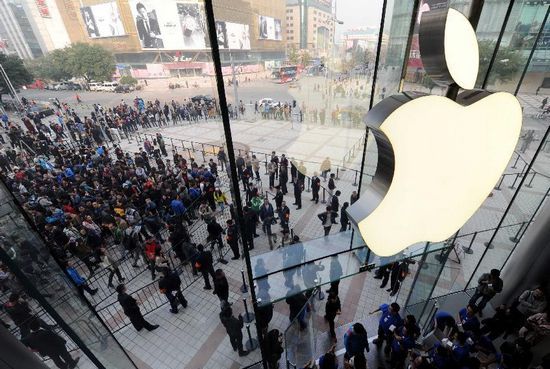Beijing court accepts Apple's review appeal
 0 Comment(s)
0 Comment(s) Print
Print E-mail China Daily, June 20, 2016
E-mail China Daily, June 20, 2016
 |
|
Customers wait to enter the Wangfujing Apple Store in Beijing, capital of China, Oct. 20, 2012. [Photo/Xinhua] |
The Beijing Intellectual Property Court has accepted an appeal by Apple to review a ruling by the capital's patent office ordering the company to halt the sales of its iPhone 6 and iPhone 6 Plus in Beijing after finding the design too closely resembles a Chinese phone.
The Beijing Intellectual Property Office said in a statement on its website that it ordered Apple and a reseller of its products in Beijing, Beijing Zoomflight Communication Equipment Co, to stop selling the two iPhone models after it found they infringed upon the rights of a Shenzhen-based company.
A spokesman for the court said it had accepted Apple's appeal to review the ruling, but it has not set a time for the hearing.
An Apple spokesman told AFP that the iPhone 6 and iPhone 6 Plus, as well as iPhone 6s, iPhone 6s Plus and iPhone SE models are "all available for sale today in China".
"We appealed an administrative order from a regional patent tribunal in Beijing last month, and as a result the order has been stayed pending review by the Beijing IP Court," the Apple spokesman said.
The complaint against Apple was filed by Shenzhen Baili Marketing Service Co, a small Chinese brand that designed a cellphone model called the 100C.
Despite a number of differences between the 100C and the iPhone 6, "the differences are too tiny to be noticeable by average consumers, and thus it should be deemed that there is no apparent difference between the two phone models", according to a verdict by the Beijing patent tribunal.
The tribunal made its ruling in May, and it was reported by Chinese media recently.
The IP dispute is the latest faced by Apple over the design of its products in China, its second-largest market after the Americas.
The company lost a four-year fight against a Beijing leather products maker in May after the Beijing Municipal High People's Court ruled in favor of Xintong Tiandi Technology, which sells a number of leather products such as smartphone cases and handbags under the name "iphone".
In 2012, Apple paid $60 million to a Shenzhen-based maker of computer screens and LED lights to settle a dispute over the iPad trademark on the Chinese mainland.
The company, Proview Technology, claimed that the Taipei subsidiary of its Hong Kong-based parent registered the iPad trademark in a number of countries and regions in 2000. Even though the iPad trademark was purchased by Apple from Proview Taipei in 2009, Proview Shenzhen said it reserved the right to use the trademark it registered on the Chinese mainland in 2001.






Go to Forum >>0 Comment(s)